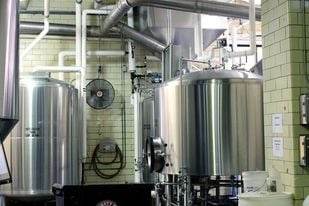Work at a new microbrewery is thrilling.
Every brewery should be concerned about information, especially those that are new, as experience usually outperforms a startup, so getting information is the greatest method to deal with it.
But, even with the knowledge, there are still a lot of significant problems that newly established micro/craft breweries must deal with.
It is usually preferable to be aware of these problems in advance so you can deal with them when they arise.
The following are a few of the problems:
The moment is now to open a microbrewery if you’ve been considering it. Beer is becoming more and more popular, which makes it a lucrative industry to enter.
There is a brewery for every taste and price range, including microbreweries, cideries, distilleries, and wineries.
What is a microbrewery, first and foremost?
The microbrewery is a company that develops alongside the local neighborhoods.
Microbreweries frequently start off by selling to neighborhood shops, who then sell to customers through small distributors.
Restaurant and beer shop growth regions, as well as localities near colleges and universities, are sites where microbreweries are expected to expand.
Places with Millennial populations are particularly attractive markets for this type of business because our target audience is better educated than the average beer drinker and is also more prone to select “experiences” over traditional products.
Factors to consider before opening a microbrewery
Here are six things you must do before opening a microbrewery.
Business Strategy for a Microbrewery
The process of opening a brewery is straightforward if you are dedicated enough.
It’s important to strike the right balance between having a solid plan in place before you get started and giving yourself room to change or pivot as you go.
Choose a name that reflects the brand identity and core values of your company.
Once you’ve selected a name for your brewery or beverage, safeguard your intellectual property by registering a trademark.
Whether you offer a casual or sophisticated beer experience, your brewery name has a big impact on how you are seen in the market, therefore it’s critical to be thoughtful when selecting your brand.
There is only one chance to make a good first impression, and if potential clients don’t know who you are, they won’t remember you.
With the help of a name brainstorming workshop, create a distinctive and unforgettable identity.
Cost of Brewing Equipment
On the other hand, the price to start a microbrewery varies according to its size, capacity, and location.
Compared to many other small businesses, microbreweries have high startup costs.
One of the most challenging parts of beginning a brewery is dealing with unforeseen expenses and charges.
Licensing fees, housing, and initial inventory are significant costs.
Brewery supplies such kettles, boilers, kegs, cooling systems, storage tanks, fermentation tanks, and filters, on the other hand, only cost about $100,000.
Your initial costs won’t be excessive because a microbrewery normally needs less space and equipment.
20 barrels can be produced annually and you’ll still make a tidy profit.
Depending on the region, the size of the firm, and changes in the market, many of this company’s operational costs are flexible.
The main costs will include the cost of brewing supplies like malt, yeast, and hops, utilities like power, gas, and sewage, as well as continual cleaning and repair costs, which will require periodically purchasing cleaning supplies.
A microbrewery typically has a three-tier distribution structure.
The brewer uses a distributor to distribute alcohol in a three-tiered system to neighborhood bars, grocers, liquor stores, and other businesses.
These customer-facing businesses then sell to customers.
Microbrews are offered all year round, and many brewers create unique seasonal promotions.
Visit Micet Group to learn more!
Licenses and permits for microbreweries
Breweries and other businesses that produce or sell alcohol must have a beer license in order to be legally owned and operated.
You can anticipate being subject to a plethora of state laws and regulations because alcohol production and sales are directly correlated.
State restrictions have a significant impact on how you can operate your brewery because the alcohol industry is heavily regulated at both the federal and state levels.
Depending on your requirements for producing and selling alcohol, you can apply for either a limited license, which allows you to sell only specific types or quantities of alcoholic beverages, or a full license.
Make sure to research the specific requirements for the area of your brewery.
Although each state has its own set of regulations for opening and operating a brewery, there are some necessary tasks and legal paperwork that you’ll need to acquire.
Microbrewery Starting Point
For microbreweries, location is crucial.
It must be in a suitable location, have adequate room for your business, and be properly set up to handle the unique requirements of alcoholic beverage production.
You’ll also need space to manage the business, store beverages, and host artists, among other things.
It’s crucial to consider the site before opening your own microbrewery.
There should be enough space for your microbrewery’s beer production, suitable parking, and easy access to neighborhood markets in a decent location.
Place it close to busy streets or neighborhoods with heavy pedestrian activity so that clients can discover it easily.
You cannot run a successful brewery if you choose a structure that does not satisfy your needs.
Safety is the most important factor, as it is with any business.
Be certain that the building you choose will pass safety inspections and enable you to conduct business safely.
Brewery Consultancy Brewing
It is a good idea to locate a professional brewery consultant to assist you through the first 30-90 days if you are not a professional brewer and are thinking about switching from home brewing to a nano brewery.
Distributors of microbreweries
In order to sell your goods more and more as you grow, you’ll need to increase your distribution network.
The government establishes a new three-tier system once you begin producing alcohol.
The initial level of distribution starts with producers, followed by wholesalers who then sell their goods to retailers, who finally sell them to the final customer.
The beer industry is based on connections, so think carefully about the distribution company you want to partner with and the details of your agreement.
Consider your current and future needs before signing a provider-distributor sales contract because most states have laws protecting them.
You should be able to get help locating the best distributor for your requirements and brand through your neighborhood brewing guild or association.
Brewpubs are not only small businesses, but they also significantly contribute to the local economy by generating jobs.
Having the appropriate partners and staff on your side is the most crucial aspect of managing a successful business.
The size of a brewpub can range from 40 to hundreds of thousands of square feet, and there might be anywhere from five and 200 individuals working there.
There are other ways to get started, including developing your own facility, purchasing an existing restaurant, or renting space that was once used by a different kind of business (such as retail store).
Brewery Promotion
All firm needs marketing, which is the phase in which you invite clients to test out your goods.
The goal of marketing is to get your brewery’s products in front of customers and convince them to make a purchase.
It’s also probably the one thing that costs the most money to run a small business.
The decision of which regions can be your possible targets is related to market research.
It serves as the cornerstone of a strong marketing strategy.
According to the most effective marketing strategies, invest in digital ads.
Using social media to market your business is a terrific place to start.
You can host launch events or simply post updates about your goods and recent advancements.
By promoting and selling your goods online, you can also draw in potential retailers and distributors.
Consider taking part in neighborhood festivals that let brewers market their products while also taking part in music, entertainment, or food events if you sell your beers in stores.
You may anticipate spending a lot of time working hard and lowering expenses while beginning a brewery.
But running a prosperous brewery comes with great benefits.
Even though beer has strong profit margins, with wise financial management and astute marketing, you may turn a capable brewery into a business that endures during difficult financial times.
The consultant for breweries will:
1. Make more of your recipes.
2. Get familiar with the Nano brewing technology.
3. Persuade prospective customers that you are on the right route.
4. Be your most dependable partner for “brewery problem solving”
5. Have your commercial brewery up and running soon.
if you want to launch your own brewery, since Micet Group has experience with beer and beverage projects, we can provide you with any help you need, from zero to turnkey.
Learn more about the expert brewing consulting services we provide.
Anchor text:Micet Group
Link:https://www.micetgroup.com/
Anchor text:Learn more
Link: https://www.micetcraft.com/
Brewery Equipment Market Growth, Risk Analysis & Growth Factors, Forecasted by 2022-2029







































